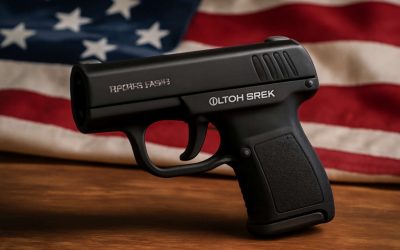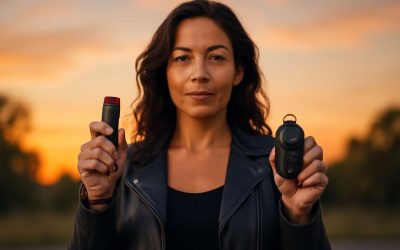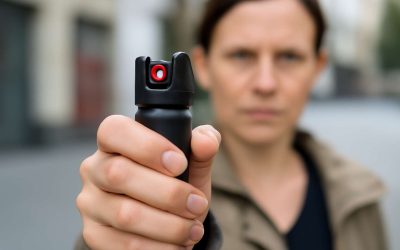Choosing the Right Self-Defense Gun
Types of Self-Defense Guns
Choosing the right type of gun for self-defense is a decision rooted in both practicality and philosophy. In South Africa, where personal safety often hinges on preparedness, understanding the nuances of various guns for self defense can make all the difference.
Different self-defense scenarios demand different tools; therefore, selecting a gun that aligns with your lifestyle and comfort level is essential. Handguns, especially semi-automatic pistols, are favored for their ease of concealment and rapid-fire capability. Revolvers, on the other hand, offer simplicity and reliability—a crucial factor when under stress.
When exploring guns for self defence, consider factors such as size, caliber, and ease of handling. For many, a compact firearm strikes the perfect balance between portability and stopping power. The choice ultimately hinges on your ability to operate the firearm confidently, ensuring safety and efficacy in critical moments.
Factors to Consider When Selecting a Gun
Choosing the right guns for self defence in South Africa is a decision rooted in both practicality and a deep understanding of personal safety needs. It’s not merely about owning a firearm but about selecting a tool that complements your lifestyle, comfort, and confidence. The stakes are high, and the wrong choice can undermine your ability to respond effectively during critical moments.
Factors such as size, caliber, and ease of handling play a pivotal role. For many, a compact firearm offers a discreet yet potent option—easy to carry and quick to deploy. When evaluating guns for self defence, consider how intuitive it is to operate under stress and whether it aligns with your training. Remember, the most reliable firearm is one you can use instinctively, especially when faced with danger.
- Assess your comfort level with different firearm types.
- Determine the caliber that balances stopping power with manageable recoil.
- Ensure the firearm’s size suits your daily routine and concealment needs.
Ultimately, selecting guns for self defence is an act of understanding oneself as much as understanding the weapon. It’s about forging a bond of trust—confidence in your firearm and in your own ability to defend what matters most. Safety, after all, is a reflection of preparedness and the wisdom to choose wisely amidst uncertainty.
Legal Requirements and Regulations
In South Africa, the legal landscape surrounding guns for self defence is as intricate as a labyrinth designed by a caffeine-fueled architect. With a rising tide of crime, owning a firearm for self defence isn’t just about personal safety—it’s about navigating a web of rules and regulations that could make even seasoned lawyers break into a sweat. According to recent statistics, over 2 million firearm licenses are currently active, but many owners are left scratching their heads about the legal requirements.
To legally carry guns for self defence, you must adhere to strict licensing procedures, which include background checks, safety training, and justifying your need for self defence. South African law demands that firearm owners demonstrate a genuine reason—such as personal safety—before granting a license. The process isn’t exactly a walk in the park; it’s more like a trek through a bureaucracy jungle.
Here’s a quick rundown of the legal essentials:
- Applying for a firearm license through the South African Police Service (SAPS)
- Providing a valid reason—most often, personal safety or home protection
- Completing a competency test to prove responsible firearm handling
- Renewing licenses periodically, often with updated background checks
Falling foul of these regulations can mean hefty fines or even criminal charges—so, understanding the legal requirements for guns for self defence is not just smart; it’s essential. When it comes to protecting yourself, being a responsible firearm owner isn’t just a moral obligation—it’s a legal necessity, too. After all, a gun for self defence is only as effective as the law allows it to be. Stay informed, stay compliant, and keep your safety game on point!
Top Self-Defense Guns on the Market
Best Handguns for Self-Defense
In a world where shadows lengthen and uncertainty lurks around every corner, the right gun for self defence can become a beacon of safety. Among the top self-defense guns on the market, the focus often lands on handguns that blend reliability with ease of use. These firearms are crafted to be both formidable and approachable, empowering individuals to protect themselves with confidence.
For those seeking the best handgun for self defence, options like the Glock 19, Smith & Wesson M&P Shield, and the SIG Sauer P365 stand out. These guns for self defence are renowned for their compact design, high-capacity magazines, and swift responsiveness. Whether concealed in a purse or holstered for quick access, they serve as steadfast guardians in times of peril.
To truly understand the landscape of guns for self defence, it’s essential to consider features such as durability, recoil management, and ergonomics. A well-chosen firearm, paired with proper training, transforms a simple weapon into a potent symbol of security. In the end, the best guns for self defence are those that inspire confidence and readiness in their wielder—guardians of peace amid chaos.
Popular Shotguns for Home Defense
In the realm of home security, few choices evoke the same sense of reassurance as a potent shotgun nestled within arm’s reach. For those seeking the ultimate in protection, the best shotguns for home defense are not merely weapons—they are modern shields forged in fire and steel. Their thunderous roar can dissuade even the most brazen intruder, transforming a quiet dwelling into a bastion of safety.
Popular shotguns for home defense, such as the Remington 870 and the Mossberg 590, blend reliability with formidable firepower. Their wide barrels and formidable shells make them ideal for close-quarters combat, offering both precision and stopping power. The sheer presence of a shotgun can be enough to deter threats before they escalate, providing peace of mind in uncertain times.
When choosing guns for self defence, it’s essential to consider ergonomics and ease of handling. A well-balanced shotgun that fits comfortably in your hand can be the difference between hesitation and swift action. Remember, in the dance of danger, confidence and readiness are your most valuable allies.
Effective Rifles for Personal Safety
In the silent corridors of safety, effective rifles for personal safety stand as unwavering sentinels—powerful yet precise, ready to turn the tide in moments of peril. These guns for self defence are more than mere tools; they are modern guardians, blending technological mastery with primal instinct. When faced with a threat, the right rifle can provide a commanding presence that ensures your safety and peace of mind.
High-caliber rifles, such as the AR-15 or the Ruger Mini-14, have gained recognition for their versatility and reliability. They offer an impressive balance of accuracy and stopping power, making them a formidable choice for those seeking guns for self defence. Their ability to be customized with various optics and accessories enhances their adaptability, transforming them into personal safety devices tailored to individual needs.
Choosing effective rifles for personal safety requires a keen eye on handling and user comfort. A well-maintained rifle that fits seamlessly into your grip can make all the difference in a tense moment. Remember, in the realm of guns for self defence, confidence is your most potent weapon—trust in your equipment and your readiness to act decisively.
Training and Safety Tips for Self-Defense Firearms
Importance of Proper Training
When it comes to guns for self defence, the importance of proper training cannot be overstated. A firearm is only as effective as the person wielding it—think of it as a high-tech hammer that needs to be wielded with finesse, not just brute force. In South Africa, where self defence situations can escalate quickly, being prepared through rigorous training can be the difference between safety and chaos.
Effective training instills muscle memory, ensuring you can respond calmly and accurately under pressure. It’s not just about pointing and shooting; it’s about understanding how to handle your gun safely, maintain control, and avoid accidental discharges. Safety tips such as always keeping your finger off the trigger until ready to shoot and knowing your target and beyond are fundamental.
Some of the best ways to prepare include:
- Attending certified firearm safety courses
- Practicing regularly at a shooting range
- Understanding local laws and regulations related to guns for self defence
Remember, a well-trained individual is the most reliable safeguard when it comes to personal safety. Mastery over your firearm isn’t just about knowing how to shoot—it’s about respecting the weapon and prioritizing safety above all else.
Safe Storage and Handling
In the realm of guns for self defence, safety isn’t just a precaution—it’s a sacred duty. Every firearm, whether nestled in your home or holstered on your person, demands meticulous handling and vigilant storage. In South Africa’s unpredictable landscape, where every moment can shift from calm to chaos, mastering safe handling ensures that your weapon remains a guardian, not a hazard.
Proper storage is the cornerstone of firearm safety. It involves more than just locking your gun away; it’s about creating a secure sanctuary that keeps curious hands and unintended accidents at bay. Consider a dedicated firearm safe, equipped with robust locks and ventilation, ensuring your self-defence gun is both accessible to you and protected from others.
- Always unload your gun before storing it.
- Use trigger locks or safes designed specifically for guns for self defence.
- Keep ammunition separate from your firearm, in a locked compartment.
Handling your gun with care is equally vital. Regularly inspecting for signs of wear, practicing proper grip, and never neglecting the fundamentals of safe shooting contribute to a disciplined mindset. Remember, a firearm’s true power lies in responsible stewardship—respect your weapon, and it will serve as an unwavering shield in moments of peril.
Effective Self-Defense Shooting Techniques
In the delicate dance of self-preservation, mastery over your guns for self defence is nothing short of an art form. Effective self-defense shooting techniques require more than just pulling the trigger; they demand precision, discipline, and a cool head. With South Africa’s unpredictable landscape, a well-honed skill set can mean the difference between safety and catastrophe.
Training isn’t just a recommendation—it’s an imperative. Regular practice ensures familiarity with your firearm, sharpens your reaction time, and cultivates muscle memory. Here’s a quick rundown of essential safety tips that can elevate your self-defense readiness:
- Always prioritize safety by adhering to fundamental firearm handling principles.
- Practice controlled, deliberate shots to maintain accuracy under pressure.
- Simulate real-life scenarios during training to build confidence and decision-making skills.
Remember, effective self-defense shooting isn’t about brute force; it’s about strategic precision and unwavering discipline. Proper training transforms your guns for self defence from mere tools into steadfast guardians, ready to serve with responsibility and respect.
Legal and Ethical Considerations
Understanding Self-Defense Laws
Understanding the legal and ethical landscape surrounding guns for self defence is crucial for responsible ownership. In South Africa, self-defense laws are complex, often rooted in the principle that any use of force must be proportionate and justified. Without proper knowledge, even well-intentioned gun owners can find themselves embroiled in legal disputes that threaten their freedom and peace of mind.
It’s vital to familiarize yourself with the specific self-defense statutes that govern firearm use in your region. Many jurisdictions operate under a “reasonable force” doctrine, which requires owners to demonstrate that their actions were necessary to prevent imminent harm. Ignorance of these laws can be costly, both financially and morally.
To navigate this terrain, some experts suggest creating a mental checklist before reaching for guns for self defence, such as assessing the threat level and ensuring that your response aligns with legal standards. Remember, ethical considerations often influence not just legal outcomes but also personal integrity—protecting your loved ones while respecting the boundaries set by law.
Ethical Use of Firearms in Self-Defense
In a world where safety is paramount, the ethical use of guns for self defence becomes a vital aspect of responsible ownership. It’s not just about having a firearm; it’s about wielding it with integrity and respect for the law. Every shot fired must be justified, proportionate, and necessary—balancing personal protection with moral responsibility.
South African law emphasizes that self-defence must be reasonable, meaning your response should never escalate beyond what is needed to neutralize a threat. An unrestrained or reckless use of guns for self defence can lead to serious legal repercussions, undermining the very purpose of owning a firearm for protection. To uphold ethical standards, many experts recommend creating a mental framework: assess the threat level carefully, and ensure your actions align with legal and moral boundaries.
Moreover, understanding the broader ethical considerations—such as respecting others’ lives and avoiding unnecessary harm—reinforces the importance of judicious firearm use. When wielded responsibly, guns for self defence become tools of protection, not instruments of violence. It’s this balance that preserves personal safety while maintaining the moral fabric of society.
Maintenance and Upkeep of Self-Defense Guns
Routine Cleaning and Inspection
Guns for self defence demand more than just ownership; they require vigilant maintenance to ensure peak performance when it matters most. Routine cleaning and inspection are the backbone of reliable firearm operation, especially in high-stakes situations. A neglected gun can jam, misfire, or malfunction at the worst possible moment—undermining your safety and peace of mind. Regular upkeep involves cleaning out residue, checking for wear and tear, and replacing parts as needed.
In fact, a well-maintained self-defense gun can be the difference between safety and catastrophe. During inspection, pay close attention to the barrel, slide, and firing pin. If you notice any irregularities or buildup, it’s time for a thorough cleaning. Use appropriate cleaning kits and lubricants designed for guns for self defence. For optimal readiness, consider establishing a maintenance schedule, such as:
- Cleaning after every use or monthly, depending on frequency
- Inspecting for rust, corrosion, or damage
- Replacing worn-out springs or parts promptly
This routine upkeep ensures your firearm remains in top condition, ready to defend when called upon. Remember, a dependable gun isn’t just about legality or caliber—it’s about consistent reliability, which only diligent maintenance can guarantee.
Proper Storage to Prevent Unauthorized Access
Proper storage of guns for self defence is crucial to prevent unauthorized access. A firearm stored improperly can fall into the wrong hands, risking accidents or theft. In South Africa, where firearm safety is a top priority, investing in secure storage solutions isn’t just smart—it’s essential.
A quality gun safe offers peace of mind. Look for safes that are tamper-proof, fire-resistant, and bolted to the floor. For quick access, consider safes with biometric locks or biometric gun safes, which allow authorized users to access their guns swiftly in emergencies.
To maximize safety, follow these steps:
- Always store guns unloaded.
- Keep ammunition separately in a secure location.
- Regularly inspect your storage setup for vulnerabilities.
Remember, the goal is to keep guns for self defence out of reach of children and intruders while ensuring you can access them immediately when needed. Proper upkeep of storage not only preserves the firearm but also fortifies your safety measures.
Replacing Worn or Damaged Parts
The true efficacy of guns for self defense hinges not only on their strategic deployment but equally on meticulous maintenance and upkeep. An often overlooked aspect is the replacement of worn or damaged parts, which can silently undermine your safety measures. When a firearm’s components begin to falter, the risk of misfire, jamming, or malfunction escalates—risks that are unacceptable in critical moments of self-defense.
Regular inspection is paramount. Look for signs of wear such as cracks, corrosion, or deformation, and address these issues before they escalate. Specialist guns for self defense often feature parts like springs, firing pins, or magazines that require periodic replacement to preserve optimal function.
- Replace worn-out springs to ensure consistent firing pressure.
- Swap damaged magazines to prevent feeding issues.
- Inspect the barrel and slide for corrosion or scoring, addressing these promptly.
In South Africa, where firearm reliability can mean the difference between safety and catastrophe, proactive maintenance transforms a mere possession into a formidable tool for self protection. When neglected, even the best guns for self defence can become liabilities. Remember, a firearm’s longevity and performance depend on vigilant upkeep—because in the realm of personal safety, there is no room for compromise.



0 Comments